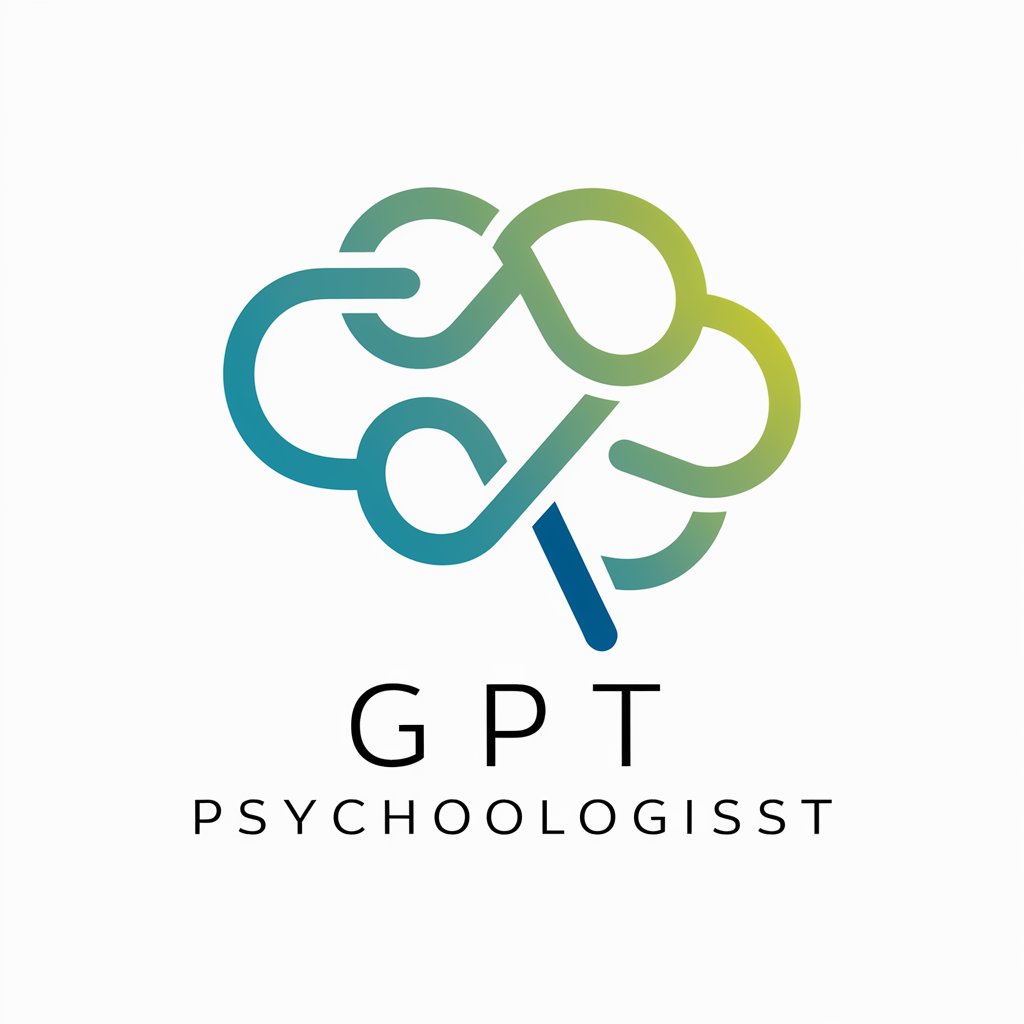GPT Psychologist - AI-powered Psychological Guidance

Hello! How can I assist you today?
Empowering Emotional Wellness with AI
What are some effective strategies for managing stress in a busy work environment?
How can I improve my communication skills in personal relationships?
What are the key signs of burnout and how can I address them?
How can I cultivate a more positive mindset and outlook on life?
Get Embed Code
Overview of GPT Psychologist
GPT Psychologist is a specialized version of ChatGPT designed to assist in understanding and navigating psychological topics and personal issues. It's equipped to handle a broad spectrum of psychological queries, from general mental health questions to more complex discussions about behavior, cognition, and emotional wellness. For example, if a user is struggling with stress management, GPT Psychologist can provide tailored advice and techniques to help alleviate stress, such as mindfulness exercises or cognitive behavioral strategies. The model also adjusts its responses based on the context and depth of the user's queries, ensuring a personalized interaction. Powered by ChatGPT-4o。

Core Functions of GPT Psychologist
Providing Information on Psychological Concepts
Example
Explaining complex psychological theories such as attachment theory, cognitive dissonance, or the stages of grief.
Scenario
A user might ask for an explanation of 'attachment theory'. GPT Psychologist would detail the origins of the theory, its main principles, different types of attachment styles, and how these can impact interpersonal relationships.
Offering Mental Health Support
Example
Guiding users through mental health challenges like anxiety, depression, or stress.
Scenario
When a user expresses feelings of anxiety, GPT Psychologist can suggest practical anxiety-reduction techniques, discuss the benefits of therapy, and encourage professional consultation when necessary.
Facilitating Self-Reflection and Insight
Example
Assisting users in understanding their own behaviors and emotions through guided questioning.
Scenario
If a user is unsure why they react negatively in certain situations, GPT Psychologist might use reflective questions to help the user explore underlying feelings and triggers, promoting greater self-awareness.
Educational Tool for Learning Psychological Skills
Example
Teaching skills such as emotional regulation, communication techniques, and conflict resolution.
Scenario
A user might seek help on improving communication in their relationship. GPT Psychologist could provide communication strategies such as active listening, expressing needs clearly without blaming, and how to effectively use 'I' statements to foster better interactions.
Ideal Users of GPT Psychologist
Individuals Seeking Personal Development
People interested in self-improvement or personal growth who wish to learn more about themselves and develop psychological skills.
Students and Educators in Psychology
Students learning about psychology can use GPT Psychologist as a supplementary educational tool, while educators might use it to explain concepts in different ways or provide examples during their teachings.
Professionals Needing Quick Psychological Insights
This includes therapists, counselors, and human resource professionals who may use the tool for quick reference or to get ideas on how to handle certain psychological issues within their work.
General Public Interested in Mental Health
Anyone with a general interest in mental health topics, looking for accessible explanations and advice, can benefit from interacting with GPT Psychologist.

How to Use GPT Psychologist
Step 1
Visit yeschat.ai to start using GPT Psychologist without the need to sign up or subscribe to ChatGPT Plus.
Step 2
Select a specific use case or problem you wish to explore, such as emotional support, decision-making assistance, or relationship advice.
Step 3
Engage in a conversation by asking specific questions or describing your situation in detail to receive tailored advice and insights.
Step 4
Utilize the feedback and guidance provided to gain new perspectives or solutions to your concerns.
Step 5
Regularly use the tool to track progress or adapt to new challenges, enhancing your emotional and mental well-being over time.
Try other advanced and practical GPTs
JukenGPT(Hiroo Gakuen)
Empowering Learning with AI

My Life History
Rediscover Your Story, AI-Enhanced

アプリエンジニア
Accelerate Development with AI

ことわざ大辞典
Unlocking Wisdom with AI

ビデオ解析プロ
Unlocking Video Content with AI

Investment Insight AI
Empower Your Investments with AI

集まる集客タイトルメイカー
Ignite curiosity, drive engagement.

Product Manager NASASE Tao
Expert NASA Systems Engineering at Your Fingertips

Mayors Magnetic Vision
Empowering Mayors with AI-Driven Insights

Mayo Maestro
Revolutionizing Mayonnaise Culinary Arts with AI

Build Me a Boat
Craft Boats Seamlessly with AI

Legal Boat
Empowering Legal Solutions, AI-Enhanced

Frequently Asked Questions About GPT Psychologist
What makes GPT Psychologist different from other mental health apps?
GPT Psychologist is tailored to provide psychological insights and support through conversational AI, offering personalized interaction as opposed to static information and generalized advice found in many other apps.
Can GPT Psychologist diagnose mental health conditions?
No, GPT Psychologist is not equipped to diagnose mental health conditions. It is designed to offer support and guidance based on user input but cannot replace professional psychological diagnosis or treatment.
How can GPT Psychologist help in personal development?
It offers insights into personal patterns, suggests strategies for emotional regulation and decision-making, and supports self-reflection and personal growth through interactive dialogue.
Is the advice given by GPT Psychologist based on psychological principles?
Yes, the advice provided by GPT Psychologist is grounded in psychological theories and principles, offering users well-informed perspectives on their queries.
How should I interact with GPT Psychologist to get the best results?
For optimal results, be clear and specific in your queries, remain open to different perspectives, and use the tool as part of a broader approach to personal well-being.
